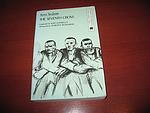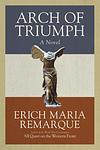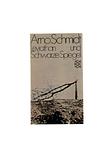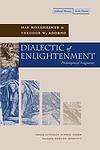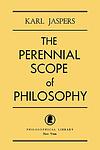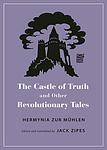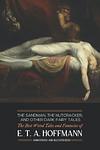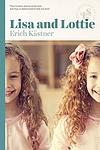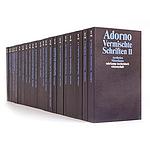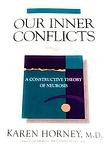The Greatest German Books From 1940 to 1949
Click to learn how this list is calculated.
This list represents a comprehensive and trusted collection of the greatest books. Developed through a specialized algorithm, it brings together 282 'best of' book lists to form a definitive guide to the world's most acclaimed books. For those interested in how these books are chosen, additional details can be found on the rankings page.
Genres
Countries
Date Range
Reading Statistics
Click the button below to see how many of these books you've read!
Download
If you're interested in downloading this list as a CSV file for use in a spreadsheet application, you can easily do so by clicking the button below. Please note that to ensure a manageable file size and faster download, the CSV will include details for only the first 500 books.
Download-
1. Doctor Faustus by Thomas Mann
The novel is a reimagining of the Faust legend set in the context of the first half of the 20th century and the turmoil of Germany in that period. It tells the story of a composer who makes a pact with the devil, exchanging his soul for unlimited creative genius. The protagonist's life and work reflect the cultural and political journey of Germany leading up to World War II, providing a deep exploration of the individual's role in a society undergoing dramatic change. The novel is also a profound meditation on the nature of time, the art and the artist, and the destructiveness of human ambition.
-
2. The Glass Bead Game by Hermann Hesse
Set in the 23rd century, the novel revolves around a highly intellectual game, the Glass Bead Game, which incorporates all fields of human and cosmic knowledge. The story follows the life of Joseph Knecht, a scholar who becomes a Magister Ludi (Master of the Game). The book explores his life and thoughts, including his relationships with others and his questioning of the values of his society. The narrative is a profound exploration of human life, knowledge, and spirituality.
-
3. Mother Courage and Her Children by Bertolt Brecht
Set against the backdrop of the Thirty Years' War, the book tells the story of a canteen woman, Mother Courage, who pulls her cart with her three children across war-torn Europe. It explores her struggles and survival tactics as she tries to profit from the war while keeping her children safe. The narrative is a profound critique of war and its consequences, highlighting the human cost of conflict and the often futile search for prosperity and security in a chaotic world.
-
4. The Seventh Cross by Anna Seghers
"The Seventh Cross" is a gripping tale set in Nazi Germany that revolves around seven men who escape from a concentration camp. The camp commandant erects seven crosses, vowing to hang each escapee on their return. The story primarily follows one escapee, who manages to evade capture and make his way back to his hometown. The narrative explores the psychological terror imposed by the Nazi regime, the resilience of human spirit, and the subtle forms of resistance within the German populace.
-
5. The Resistible Rise of Arturo Ui by Bertolt Brecht
"The Resistible Rise of Arturo Ui" is a satirical play that uses the rise of a fictional 1930s Chicago mobster, Arturo Ui, to parallel the rise of Adolf Hitler in Nazi Germany. The narrative is a critique of those who allowed Hitler to come to power, emphasizing that his rise was indeed resistible. The play explores themes of power, corruption, manipulation, and the dangers of complacency, showcasing the destructive potential of unchecked ambition and the failure of society to prevent the ascent of dangerous individuals.
-
6. Arch Of Triumph by Erich Maria Remarque
Set against the backdrop of the looming Second World War in Paris, the narrative follows a German refugee and surgeon who is living without proper documents after escaping from Nazi Germany. Haunted by his past and the horrors he has witnessed, he navigates the dark streets of Paris, performing surgeries in a clandestine practice for other displaced immigrants. Amidst his struggle for survival and identity, he engages in a passionate but tumultuous love affair with an Italian woman, which brings temporary solace but ultimately leads to greater despair. The story is a poignant exploration of exile, loss, and the human desire for connection and meaning in the face of relentless adversity.
-
7. The Caucasian Chalk Circle by Bertolt Brecht
The play is a parable set in the Soviet Union that explores themes of justice, class struggle, and morality through the story of Grusha, a servant girl who risks her life to protect an abandoned child of noble birth during a time of revolution. As the child grows, a dispute over his custody arises, leading to a trial presided over by a wily, unconventional judge named Azdak. The trial's resolution hinges on the titular chalk circle test, which ultimately reveals the true nature of parental love and the importance of putting the needs of the child first. The narrative is a commentary on the social and political issues of the time, advocating for a society that prioritizes the welfare of its most vulnerable members.
-
8. Transit by Anna Seghers
A German man escapes from a Nazi concentration camp during World War II and finds himself stuck in Marseille, France, where he assumes the identity of a deceased author to secure a transit visa. As he navigates the bureaucratic maze of the immigration process, he becomes entangled in the lives of the refugees around him, including a desperate woman searching for her missing husband, the very man he's impersonating. The novel explores themes of identity, displacement, and the human struggle for freedom.
-
9. Leviathan by Arno Schmidt
"Leviathan" is a complex narrative that delves into the psyche of a German intellectual coping with the aftermath of World War II. The protagonist, a reclusive translator, grapples with his own personal demons and the broader existential crisis of a nation in ruins. Through a series of introspective monologues and interactions with both real and imagined characters, the book explores themes of guilt, isolation, and the search for meaning in a world that has been irrevocably altered by the horrors of war. The novel's dense and challenging prose, combined with its allusions to mythology and literature, creates a rich tapestry that demands the reader's engagement with the historical and philosophical questions it raises.
-
10. The Fear Of Freedom by Erich Fromm
The book explores the psychological and societal mechanisms that lead individuals to relinquish their autonomy and seek security in authoritarian systems, despite the inherent dangers of such a surrender. It delves into the historical context of the 20th century, particularly the rise of fascism and totalitarianism, to understand the paradoxical inclination of people to escape freedom's responsibilities. The author argues that true freedom requires not only the absence of external constraints but also the presence of inner psychological conditions that enable self-reliance, critical thinking, and the ability to love and connect with others. The work challenges readers to confront the difficult task of achieving positive freedom through self-awareness and the development of one's human potential.
-
11. Dialectic Of Enlightenment by Max Horkheimer, Theodor Adorno
"Dialectic of Enlightenment" is a seminal philosophical work that explores the nature of enlightenment and its paradoxical relationship with the concept of reason. The authors argue that the Enlightenment's quest for knowledge, freedom, and autonomy has inadvertently led to the opposite: a form of domination and control through instrumental reason. They examine how the Enlightenment's rationality, once aimed at liberating individuals from myth and superstition, has devolved into a tool of oppression, giving rise to totalitarian systems and a culture industry that manipulates mass society. The book delves into various cultural artifacts, including literature, film, and popular culture, to illustrate how enlightenment has become self-destructive, ultimately questioning the possibility of true emancipation in a society governed by the very rationality that was supposed to set it free.
-
12. The Structure And Practice Of National Socialism by Franz Neumann
The book provides a comprehensive analysis of the political, social, and economic systems of National Socialism in Germany from its rise to power to its functioning during World War II. It delves into the regime's ideologies, the role of terror and propaganda, the structure of the state, and the interplay between different power groups within the Nazi hierarchy. The author critically examines how the regime sought to create a totalitarian state, with a particular focus on the suppression of individual freedoms and the mechanisms of control used to maintain its authority. Through this exploration, the book offers insights into the complexities and contradictions of the Nazi system, as well as the devastating impact it had on society and the world at large.
-
13. The Perennial Scope Of Philosophy by Karl Jaspers
The book in question explores the enduring nature of philosophical inquiry, examining how it transcends temporal and cultural boundaries to address fundamental questions of existence, knowledge, and ethics. The author argues that philosophy is not confined to any particular era or dogma but is a continuous pursuit of truth that evolves with human thought while remaining rooted in the quest for universal understanding. Through a critical examination of historical philosophical movements and their contributions to the ongoing dialogue, the work emphasizes the importance of philosophy in providing a framework for individuals to confront the mysteries of life and the universe, encouraging readers to engage in their own philosophical contemplation.
-
14. Track by Ernst Bloch
"Track" is a philosophical exploration of the concept of utopia and the human desire for a better future. The author argues that utopia is not a specific place or time, but a driving force in human consciousness that propels us forward. Throughout the book, he delves into various aspects of culture, philosophy, and politics to illustrate his points, suggesting that the longing for utopia is a fundamental part of human nature and a necessary component of any progressive social change.
-
15. The Black Brothers by Lisa Tetzner
"The Black Brothers" is a captivating historical novel set in 19th-century Switzerland. It tells the story of four brothers, who, due to unfortunate circumstances, are forced to work as chimney sweeps. Through their perseverance and unity, they navigate the harsh realities of their profession and form a strong bond with each other. The book explores themes of resilience, friendship, and the fight for justice, making it a compelling and heartwarming read.
-
16. The Best Tales Of Hoffmann by E. T. A. Hoffmann
"The Best Tales of Hoffmann" is a collection of captivating and imaginative stories written by E. T. A. Hoffmann. This anthology showcases the author's unique blend of fantasy, horror, and romance, taking readers on a journey through mysterious and enchanting worlds. From a man's obsession with a mechanical doll to a musician's encounter with a supernatural violin, each tale is filled with suspense, intricate plots, and vivid characters that will leave readers spellbound.
-
17. Lottie And Lisa by Erich Kästner
The book tells the charming story of identical twin sisters separated at birth who meet unexpectedly at a summer camp. Initially unaware of their relationship, the girls take an instant dislike to each other due to their identical appearances, but as they get to know one another, they discover their shared parentage. They decide to switch places, with each going to live with the parent the other has grown up with, in an attempt to reunite their estranged family. Through a series of heartwarming and humorous events, the twins work together to bring their mother and father back together, exploring themes of family, identity, and the bond between siblings.
-
18. Philosophy of Modern Music by Theodor Adorno
This book offers a comprehensive analysis and critique of modern music, focusing on the works of two prominent 20th-century composers. The author explores the relationship between society and music, arguing that the evolution of music reflects changing social and political landscapes. The text suggests that the dissonance and atonality in modern music reflects the alienation and disillusionment of modern society. The book is a seminal work in the field of music philosophy and is renowned for its in-depth exploration of the societal implications of musical developments.
-
19. Escape from Freedom by Erich Fromm
This book delves into the psychological and social mechanisms that make people afraid of freedom, leading them to seek safety in authoritarian systems. The author explores the concept of freedom in the context of historical events like the Reformation and the rise of democracy, arguing that while these events have given people more freedom, they have also left many feeling isolated and anxious. He suggests that this anxiety can lead to a desire for conformity and submission to a powerful authority, potentially leading to the rise of totalitarian regimes.
-
20. The Good Person of Szechwan by Bertolt Brecht
"The Good Person of Szechwan" is a parable play that explores the difficulty of maintaining one's morals and goodness in a corrupt and exploitative world. The story revolves around a kind-hearted prostitute who struggles to be a good person under the harsh realities of life in Szechwan. When three gods visit the city in search of a good person, they find only her willing to help them. However, to survive, she must adopt a ruthless alter ego, leading to a complex exploration of morality, identity, and societal pressures.
-
21. Every Man Dies Alone by Hans Fallada
The book is a gripping tale of quiet resistance set in Nazi Germany, based on a true story. It follows a working-class couple who, after losing their son in the war, decide to stand against the oppressive regime by distributing postcards with anti-Nazi messages throughout Berlin. Their clandestine operation, though small in scale, becomes a symbol of personal defiance and moral conviction in the face of overwhelming fear and totalitarian control. As their acts of rebellion continue, they must evade the Gestapo's increasing efforts to hunt them down, leading to a tense and poignant exploration of courage, resilience, and the impact of individual actions in a society dominated by tyranny.
-
22. Lisa And Lottie by Erich Kastner
This classic children's novel tells the heartwarming story of identical twins, separated at birth, who meet unexpectedly at a summer camp. Despite their vastly different upbringings - one raised in a wealthy household and the other in a modest home - the sisters devise a plan to switch places, aiming to experience each other's lives and ultimately reunite their estranged parents. Through a series of adventures and misadventures, the twins navigate the challenges of their deception, learning valuable lessons about family, love, and identity along the way. The story is a touching exploration of sibling bonds and the lengths to which family will go to find each other and reconnect.
-
23. Our Inner Conflicts by Karen Horney
The book delves into the complex world of psychoanalysis, exploring the internal struggles that individuals face as a result of conflicting impulses and desires. The author argues that these internal battles are rooted in the basic human need for security and affection, which, when threatened, can lead to neuroses. The work emphasizes the importance of self-awareness and the examination of one's own psychological mechanisms to overcome these conflicts. This introspective journey is presented as a pathway to personal growth, self-understanding, and ultimately, mental health.
-
24. Poems Of Gottfried Benn by Gottfried Benn
The collection presents a selection of works by a prominent German poet and essayist, known for his intellectual depth and expressionist style. The poems delve into themes of existential despair, the conflict between intellect and emotion, and the search for meaning in a fragmented modern world. The poet's complex imagery and innovative use of language reflect his medical background and his struggle with the societal upheavals of the early 20th century. His work often oscillates between a dark, nihilistic view of humanity and a profound appreciation for the beauty of art and the human spirit, offering readers a challenging but rewarding exploration of the human condition.
-
25. The Good Woman Of Setzuan by Bertolt Brecht
In this play, three gods descend to Earth in search of a single good person, and they find Shen Te, a kind-hearted but impoverished prostitute in the Chinese province of Szechwan. To reward her goodness, they give her money, which she uses to buy a tobacco shop. However, her generosity leads to her being exploited by everyone around her. To protect herself and her assets, Shen Te adopts the male alter ego of Shui Ta, who is pragmatic and shrewd. The dual identity allows her to navigate the complexities of societal expectations and moral dilemmas, ultimately questioning whether it is possible to be good in a world that rewards selfishness and greed. The play explores themes of economic inequality, morality, and the struggle to maintain goodness in the face of harsh realities.
Reading Statistics
Click the button below to see how many of these books you've read!
Download
If you're interested in downloading this list as a CSV file for use in a spreadsheet application, you can easily do so by clicking the button below. Please note that to ensure a manageable file size and faster download, the CSV will include details for only the first 500 books.
Download


